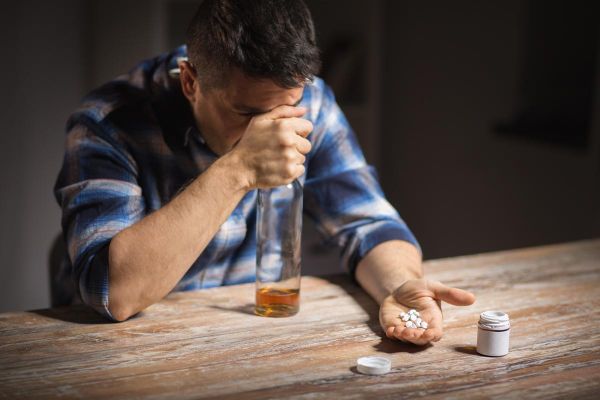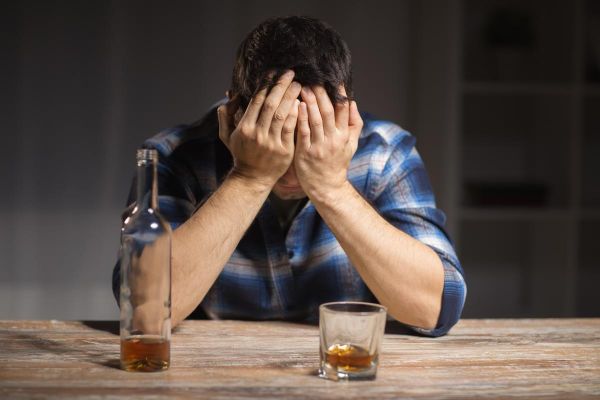 Today, some 12.7% of the population takes antidepressants at any given time, accounting for 1 in 6 Americans. While these antidepressants are used to treat everything from depression to panic disorder, they often offer much-needed relief from mental illnesses, helping individuals to find stability and to benefit from therapy. Yet, most Americans also drink. In fact, 86.3% of the population report occasional drinking, but over half of all Americans drink on a weekly or monthly basis. Drinking is a huge part of American social culture, to the point where not drinking can be seen as weird. Most of us also like to drink. Our alcohol consumption is legitimized and normalized under the guise of culture with craft beer, specialty whiskey, and refined cocktails lending credence to the idea that it’s okay to drink often and alone. For most of us, drinking isn’t a huge problem. In moderation, alcohol consumption can be a perfectly healthy thing. For those of us on antidepressants, the situation becomes significantly more complex.
Today, some 12.7% of the population takes antidepressants at any given time, accounting for 1 in 6 Americans. While these antidepressants are used to treat everything from depression to panic disorder, they often offer much-needed relief from mental illnesses, helping individuals to find stability and to benefit from therapy. Yet, most Americans also drink. In fact, 86.3% of the population report occasional drinking, but over half of all Americans drink on a weekly or monthly basis. Drinking is a huge part of American social culture, to the point where not drinking can be seen as weird. Most of us also like to drink. Our alcohol consumption is legitimized and normalized under the guise of culture with craft beer, specialty whiskey, and refined cocktails lending credence to the idea that it’s okay to drink often and alone. For most of us, drinking isn’t a huge problem. In moderation, alcohol consumption can be a perfectly healthy thing. For those of us on antidepressants, the situation becomes significantly more complex.
If you or your loved one has been prescribed an antidepressant, it’s always a good idea to discuss alcohol with your doctor. In most cases, you’ll want to quit or at least ensure your drinking doesn’t exceed more than a few units of alcohol per week. And, if you can’t moderate drinking, it’s a good time to think about why.
Alcohol and Different Types of Antidepressants
Alcohol and antidepressants interact, but how, when, and why can vary quite considerably depending on the antidepressants you’re taking. Most people are prescribed to one of four major types of antidepressants – SSRIs, SNRIs, TCAs, or MAOIs – but some may be prescribed to other drugs such as benzodiazepines or NaSSAs, (Noradrenergic and Specific Serotonergic Antidepressants). It’s always important to talk to your doctor about combining any drug with alcohol. It’s also always important to follow the prescription recommendations, because the interaction between the drug and alcohol may vary considerably with dosage and body weight.
SSRIs – Selective Serotonin Reuptake Inhibitors are one of the most common prescription antidepressants, comprising drugs like citalopram (Celexa), escitalopram (Lexapro), fluoxetine (Prozac), and sertraline (Zoloft). SSRIs have a minimal interaction with alcohol and are therefore the safest option to combine with alcohol. However, it’s still not recommended, as many patients experience excessive drowsiness and may have a significantly reduced tolerance to alcohol following starting the drug. In addition, SSRIs cause significant irritation to the gastrointestinal lining, meaning that gastrointestinal damage caused by alcohol could be significantly worsened.
SNRIs – Serotonin and Norepinephrine Reuptake Inhibitors like duloxetine (Cymbalta), venlafaxine (Effexor) and desvenlafaxine (Pristiq) are used to treat everything from major depression to mood disorders, ADHD, OCD, anxiety, and other disorders. Like SSRIs, these drugs have a minimal interaction with alcohol, but could decrease tolerance and will increase drowsiness. Patients also experience significant gastrointestinal distress on these antidepressants, which could interact badly with alcohol.
TCAs – Tricyclic Antidepressants including amitriptyline (Elavil), amoxapine-clomipramine (Anafranil), desipramine (Norpramin), doxepin (Sinequan), and protriptyline (Vivactil), are quickly becoming less popular for treating depression, but are still used to treat depression, anxiety, and other mood disorders. Many often use them as a secondary drug alongside SSRIs or SNRIs to increase production of serotonin and norepinephrine in the brain. Consuming alcohol alongside these drugs renders them almost completely ineffective. It is not advisable to consume any amount of alcohol with a TCA prescription. Alcohol and TCAs also have a heavily sedative effect in combination, meaning the individual will likely experience extreme drowsiness. Most people will also have issues with coordination and balance while starting the medication, and it’s always a good idea to avoid alcohol completely during this period.
MAOIs – Monoamine Oxidase Inhibitors include drugs like phenelzine (Nardil), tranylcypromine (Parnate), isocarboxazid (Marplan), and selegiline (Eldepryl). While once a first-line treatment for depression and anxiety, MAOI’s are now considered second line – used when other treatments have failed – because they have significant interactions with food and drinks. MAOIs can be dangerous in combination with alcohol, causing extreme elevated blood pressure because of a substance known as tyramine, which is found in wine, beer, and fortified wines like sherry.
Alcohol with Depression and Anxiety
 While alcohol has minimal interactions with many modern antidepressants, alcohol interacts with mental illness in other ways. This means that it’s likely important for you to manage or stop alcohol consumption while on an antidepressant, simply because it will interact with your health in other ways.
While alcohol has minimal interactions with many modern antidepressants, alcohol interacts with mental illness in other ways. This means that it’s likely important for you to manage or stop alcohol consumption while on an antidepressant, simply because it will interact with your health in other ways.
Vulnerability to SUDs – A substance use disorder is defined as when an individual shows compulsive and seeking behavior, is unable to control drinking, and is aware of the harm that alcohol consumption causes but is unable to stop. Individuals with anxiety, depression, and mental illnesses are significantly more vulnerable to substance use disorder. Studies report that 36-40% of individuals in substance use disorder clinics have a co-occurring mental use disorder. Most importantly, the risk factors for mental illness and substance use disorders heavily overlap, meaning that you’re more at risk for a substance use disorder even before you develop symptoms of a mental disorder.
Alcohol Exacerbates Mental Illness – While mental illnesses exacerbate alcohol use disorder, it also a well-studied fact that alcohol can actually exacerbate many of the issues behind mental illnesses like depression, anxiety, OCD, and bipolar disorder. This relates to the complex interaction of alcohol with neurotransmitter and hormone production in the body. Alcohol interacts with serotonin and GABA, which both heavily influence mental health. Individuals who consume large quantities of alcohol will also find themselves becoming more impulsive, more prone to taking risks, and more prone to using alcohol to self-medicate and feel better. Alcohol is a depressant, and it does negatively impact most mental disorders, causing further depression, energy dips, and problems with performance and concentration.
Many people on antidepressants can safely consume a small quantity of alcohol, even on a daily basis. But, many cannot. It’s important to talk with your doctor about your usage of alcohol, set a maximum allowable alcohol intake, and stick to it. You will likely be strongly advised to quit alcohol completely for the first 2-12 weeks of your medication, because early drug interactions can be quite extreme. If you struggle to do so, it may be time to seek out help for substance abuse. If your doctor suggests it’s okay to drink on your medication, consider having a few drinks at home to get a good idea of how alcohol affects you with your new medication, before drinking while out.
Getting Help
The Gooden Wellness Center is a mental illness and substance use disorder treatment center, offering evidence-based care and therapy. We offer outpatient treatment, as well as residential care at our home-like treatment center, designed for individuals struggling with mental illness like depression, anxiety, bipolar disorder, schizophrenia, OCD, and more. We also offer full support for substance use disorder and dual-diagnosis patients, with programs to help you through every step of recovering from alcohol use disorder. We leverage tools like DBT, CBT, and science-based counseling, delivered by licensed medical professionals, to offer a compassionate and personalized treatment for your individual problems.
Mental disorders, whether anxiety and depression or a substance use disorder, impact every aspect of your health and your life. It’s critical that you get the help you need to live a happy and healthy life. The Gooden Center is here to offer that help. Call us at 800-931-9884 to learn more.